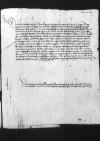Wes ahnn unns unnser underthann unnd burger Peter Stubes ⌊Peter StubesPeter Stubes ⌋ der stadt Kneiphof (Knipawa), city in Ducal Prussia, one of three cities, which Königsberg consisted of; today in Russia, Kaliningrad Oblast⌊Kneiphoff KonigspergkKneiphof (Knipawa), city in Ducal Prussia, one of three cities, which Königsberg consisted of; today in Russia, Kaliningrad Oblast⌋, / supplicirenn thut / habenn E(uer) L(ieb) aus eingeschlossener seÿner supplication zuersehenn. / Dieweil er unns dann inenn darauff ahnn E(uer) L(ieb) domit er umb sovil desteher zu dem seynenn khommen möcht zuverschreÿbenn demuttigs vleiss angelangtt unnd gebethenn, / habenn wir ime dieselbe yhn anmerckung das wir ihe gernn unsere arme underthanenn ÿhnn irenn billichen und rechtfertigenn sachenn gefurdertt sehenn und wissenn woltenn / mit gnaden nit wegernn wollenn. /
Ist derwegenn ahnn E(uer) L(ieb) unser freuntlich und nachparlich bith, / dieselb wollen irem heuptmann zu Rössel (Reszel), town in Ermland (Warmia), 55 km NE of Allenstein (Olsztyn), on the border with Ducal Prussia⌊ResellRössel (Reszel), town in Ermland (Warmia), 55 km NE of Allenstein (Olsztyn), on the border with Ducal Prussia⌋, / oder wie es derselbenn am bestenn gelegenn / mit gnaden bevelenn lassen, / das ehr die ihenigenn so gedachtem unserm underthann, / noch etzlich hinderstellig erb / und furgestrackt gelt lauts seÿner supplicationn schuldig, / dohin haltenn unnd weÿsenn wolle, / das er das seyne one weÿternn nachteyligenn vertzug oder beschwer, / nachdem er ein alter schwacher man / der nit weitt reÿsen khan / unnd neun lebendiger kinder hatt / bekhommen möge / unnd inenn dieser unnser furschrifft geniesslich unnd ersprisslich entpfindenn lassenn. / Das seindt wir umb E(uer) L(ieb) unnd die ewern gleichs fals zuthun geneigt.


 BCz, 1606, p. 502
BCz, 1606, p. 502